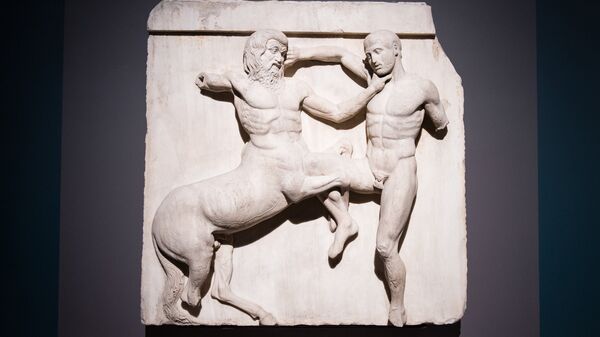Sputnik has discussed the issue with Matthew Taylor, member of the British Association for the Reunification of the Parthenon Sculptures.
Sputnik: With France and Belgium creating a precedent for international repatriation, how will Greece take the UK’s current refusal to return the artwork?
But the moment you start tackling it as an international issue, which may mean making some kind of compromise or some sort of deal, politicians worry that that might be portrayed badly in the press in some sort of way, sort of betraying Greece's ownership from it. So there's always been quite a tendency to talk a lot about it domestically, and not to actually engage with it so much publicly.
So cases like the ones in France and Belgium, they obviously weaken the British case even more, so it gets Greece more incentive to deal with it, but Britain hasn't dealt with it seriously: when they've received letters from Greece, they've left them on the table for as long as they possibly could, and then sort of jotted down a quick reply to them. They've never really treated it as a serious issue that they actually need to think about.
Sputnik: Why is the British Museum refusing to repatriate the Elgin Marbles? Is it for profit or for some other reason?
Matthew Taylor: Most of the British Museum's money comes from the government, from the Ministry of Culture; a smaller proportion of their money — we're talking sort of less than a quarter of it — comes from temporary exhibitions that they run, the shop, and stuff; most of it being temporary exhibitions are the big owner for them.
Obviously things are hard to estimate. And if they have those, those will be temporary exhibition, those will be new things and as new items (which make people keep pulling back to the museum), so from the money point of view, they would probably, actually, make more money, if the marbles weren't there, and they were offered a series of new exhibitions instead — because the new exhibitions are what drag people in there, once they've already been at the museum. It's an entrenched view that they don't want to give anything back.
They fear it's opening the floodgates, which, if you're using that excuse, it's the suggestion that you believe that something is the right thing to do, but you're not going to do it now for fear of having to do the right thing again, at some point in the future.
I feel like that's getting kind of left behind in global museum practice, really: the US has led the way, first of all, with a lot of returns of Native American artefacts, for instance; and more recently, they've admittedly through legal action been forced to return items from the Metropolitan Museum and the Getty and other museums, particularly to Italy, which has been very successful in retrieving stuff.
And I kind of feel like the British Museum has missed an opportunity to return stuff in this way, and actually reinvented itself as a museum of the 21st century, that wished that Britain decolonised during the 20th century — and that was a long process, and it's pretty much over. But there's this whole process of cultural decolonization, of not actually returning stuff that came during that period, which is kind of yet to happen, really.
It's an ideologically-driven thing: it's not about the money, because the money doesn't come to them for specific exhibits, really.
It's interesting, though, that there have been some cases where they have returned stuff in different ways: thinking back, around year 2000 or not long after that, there was a mask from a Canadian First Nations tribe (they're Aboriginal groups in one of the islands near Vancouver).
And that first person turned up at the museum, and just said, "Can we have our mask back?", and got laughed at as they refused; but they kept on persisted at this, and talked about the significance of this mask to their tribe.
And eventually they did get it returned, i think in 2006, 2007. It was returned, and that happened on a three-year loan that was renewable up to three times. So in theory, it will be nine years — which would expire now; but I haven't heard anything saying that it's actually returned.
So I think the whole thing has been renewed again, and it's sort of becoming a semi-permanent loan, which is something that the British Museum actually said in their recent statement that can't happen, that they don't countenance loans of indefinite periods (whereas they're actually the recipients of the artefacts in their collection that's on long term loans, from churches and places like that).
Sputnik: Labour Party leader Jeremy Corbyn said he will return the Elgin Marbles, if he becomes Prime Minister. Would he be able to do so, despite the British Museum's opposition to such move?
Matthew Taylor: I've known Jeremy Corbyn's views on the Marbles for a long time. I think I first had a letter from him on it in about 2004. But looking back, he's actually signed early day motions in Parliament which are a kind of a precursor to someone drawing a bill to gauge opinions of MPs.
So what would have to happen though, once they came in is — the British Museum operates independently of the government; but at the same time, if there was a political will for something to happen, they can put a lot of pressure on the museum, they control the museum's funding, for instance.
At present the law that the British Museum can't deaccession artifacts apart from in a couple of very specific categories (mainly if they're duplicates or they're damaged to the extent of being worthless).. if either that law could be amended or there's nothing to stop them doing stuff as a loan, at the end of the day, if negotiations happen between the British government and the Greek government, they would push very, very hard on the museum to make such an arrangement.
Now, the British Museum would know a pushback at this. There was a similar case in Palermo, when Berlusconi was Prime Minister and he said to the Greek government, "We're going to lend you this fragment from the Parthenon Marbles that's in the museum and Palermo," without properly consulting with the museum in Palermo.
And that loan actually was stopped at the last minute: the plane was on the runway, ready to leave, and Greece was expecting this artifact to arrive later in the day, and that was put on hold because the museum complained about the government overriding their independence; then that loan actually took place within the next couple of years.
They used the publicity of it, the museum entered into that kind of negotiations. It happened as a loan: Greece took the loan, and then they returned it back — which proves that Greece does actually honor loans of the Parthenon sculptures — which,I think, what the British Museum often says, "Well, we won't lend them, because they won't give them back." But when they've been given once by Palermo and the Vatican, they have returned them afterwards.
So clearly they are willing to honour the terms of loans, as long as the terms are sensible at the time of taking it out.
Views and opinions expressed in this article are those of Matthew Taylor and do not necessarily reflect those of Sputnik.





